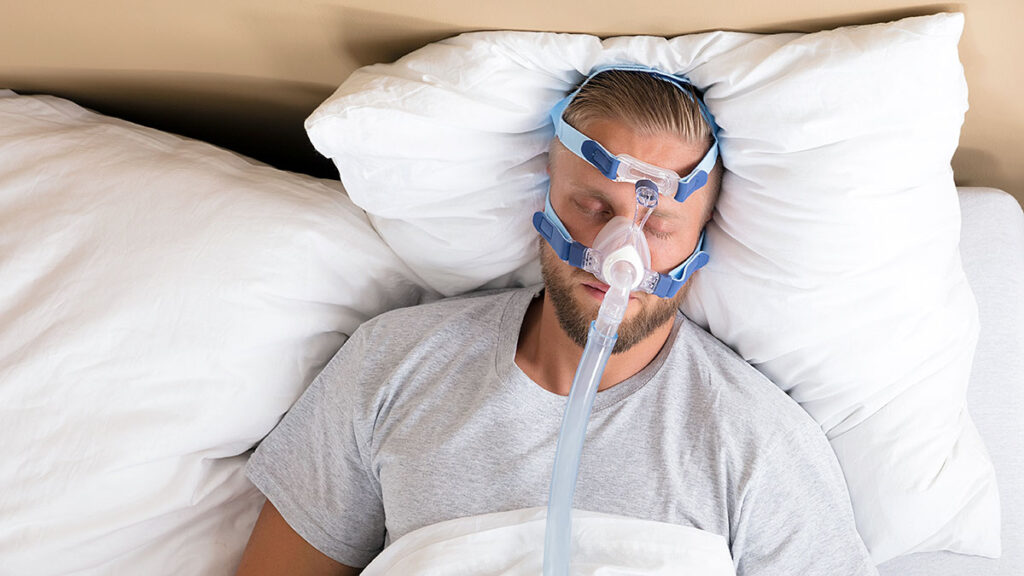Learn how sleep apnea increases the risk of atrial fibrillation and discover strategies for managing both conditions effectively.
How Sleep Apnea Affects Heart Health
Sleep apnea, a condition where breathing repeatedly stops and starts during sleep, is a major risk factor for atrial fibrillation (AFib). Obstructive sleep apnea (OSA), the most common type, causes intermittent oxygen deprivation, leading to increased stress on the heart. These disruptions in oxygen levels activate the body’s stress response, triggering the release of stress hormones such as adrenaline. Over time, these changes can damage the heart’s electrical system and make it more prone to arrhythmias like AFib.
Research shows that untreated sleep apnea significantly raises the risk of developing AFib, as well as recurring episodes in those already diagnosed. Recognizing and addressing sleep apnea is critical to improving heart health and reducing AFib-related complications.
Signs and Symptoms of Sleep Apnea
Sleep apnea often goes undiagnosed because its symptoms primarily occur during sleep. Common signs of sleep apnea include:
- Loud, persistent snoring or gasping for air during sleep
- Periods of breathing cessation, often noticed by a partner
- Daytime fatigue or excessive sleepiness
- Morning headaches
- Difficulty concentrating or memory problems
- Restless or fragmented sleep
Patients with atrial fibrillation should be particularly mindful of these symptoms, as managing sleep apnea can play a vital role in stabilizing heart rhythms. If you or a loved one exhibit these signs, consider consulting a healthcare provider for evaluation and possible diagnostic testing, such as a sleep study.
The Link Between Sleep Apnea and Atrial Fibrillation
OSA creates a cascade of physiological changes that increase the likelihood of AFib. When airflow is interrupted during sleep, the resulting oxygen deprivation causes the heart to work harder. This increased workload can lead to changes in heart structure, such as atrial enlargement, and disrupt normal electrical signaling. Additionally, the repeated arousals from sleep caused by apnea episodes can increase sympathetic nervous system activity, further elevating the risk of arrhythmias.
Research highlights the bidirectional relationship between sleep apnea and AFib: not only does sleep apnea increase the risk of developing AFib, but AFib itself can worsen sleep apnea. This underscores the importance of addressing both conditions simultaneously to achieve better outcomes.
Managing Sleep Apnea to Improve AFib Outcomes
For patients with both sleep apnea and AFib, a combined approach to treatment is essential. Here’s how:
- Continuous Positive Airway Pressure (CPAP): CPAP therapy is the gold standard for treating obstructive sleep apnea. By keeping airways open during sleep, CPAP devices prevent oxygen drops and reduce stress on the heart. Studies show that CPAP therapy can significantly decrease the recurrence of AFib in patients undergoing catheter ablation or other treatments.
- Weight Management: Excess weight is a major risk factor for both OSA and AFib. Losing even a modest amount of weight can reduce the severity of sleep apnea and lower the overall strain on the heart. Combining weight management with other therapies often leads to better long-term outcomes.
- Lifestyle Modifications: Small changes in daily habits can make a big difference. Reducing alcohol intake, avoiding sedatives, and maintaining a consistent sleep schedule improve sleep quality and reduce the impact of OSA on AFib.
- Treating AFib Concurrently: Managing AFib may involve catheter ablation, anticoagulation therapy, or other medications. When combined with sleep apnea treatment, these strategies can reduce the severity of arrhythmia episodes and improve overall heart health.
- Regular Follow-Up: Continuous monitoring and regular consultations with your healthcare team ensure that both conditions remain well-controlled. Advanced monitoring technologies, such as wearable devices or implantable loop recorders, can help track heart rhythms and identify potential issues early.
The Importance of a Multidisciplinary Approach
Because sleep apnea and AFib are so closely linked, a multidisciplinary approach to care is often the most effective. Collaboration between cardiologists, sleep specialists, and primary care physicians ensures that both conditions are addressed comprehensively. For example, a cardiologist might recommend ablation for AFib while a sleep specialist ensures effective CPAP adherence. This coordinated care model not only reduces symptoms but also enhances long-term health outcomes.
The Role of Technology in Diagnosis and Treatment
Advancements in medical technology have made it easier to diagnose and manage sleep apnea and AFib. Portable sleep study devices allow patients to undergo diagnostic testing in the comfort of their own homes. Similarly, CPAP machines have become more user-friendly, with features like auto-adjusting pressure levels and mobile app integration for tracking progress.
In the realm of AFib management, wearable devices like smartwatches can monitor heart rhythms and detect irregularities in real time. This technology empowers patients to take a more active role in their healthcare and provides clinicians with valuable data for tailoring treatment plans.
Tips for Better Sleep Hygiene
Improving sleep hygiene can benefit patients with both sleep apnea and AFib. Consider the following tips:
- Maintain a Regular Sleep Schedule: Go to bed and wake up at the same time each day, even on weekends.
- Create a Relaxing Bedtime Routine: Engage in calming activities such as reading or taking a warm bath before bed.
- Optimize Your Sleep Environment: Keep your bedroom cool, dark, and quiet. Invest in a comfortable mattress and pillows.
- Avoid Stimulants: Limit caffeine and nicotine intake, especially in the afternoon and evening.
- Limit Screen Time Before Bed: Reduce exposure to blue light from phones, tablets, and computers, as it can disrupt your natural sleep-wake cycle.
When to Seek Help
If you suspect sleep apnea or struggle with AFib, seeking professional care is crucial. Untreated sleep apnea can worsen arrhythmia symptoms and increase the risk of complications such as stroke. Dr. Adam Budzikowski specializes in the comprehensive management of atrial fibrillation and related conditions. Schedule a consultation today to develop a personalized plan that addresses both your heart and sleep health.
A Riley Publication
Medically Reviewed By: Adam Budzikowski, MD, PhD
